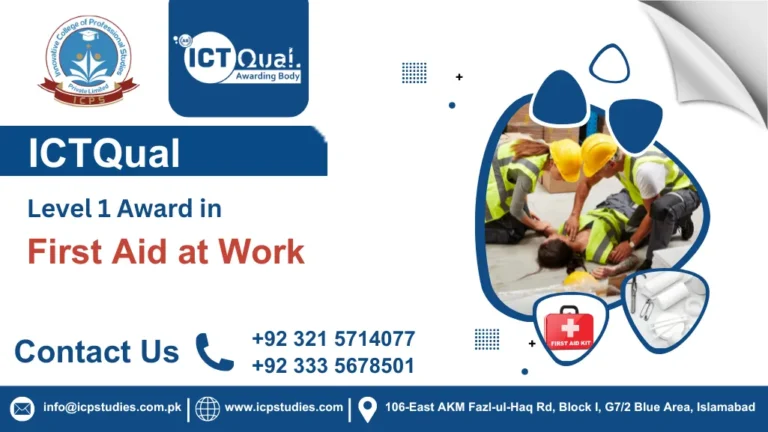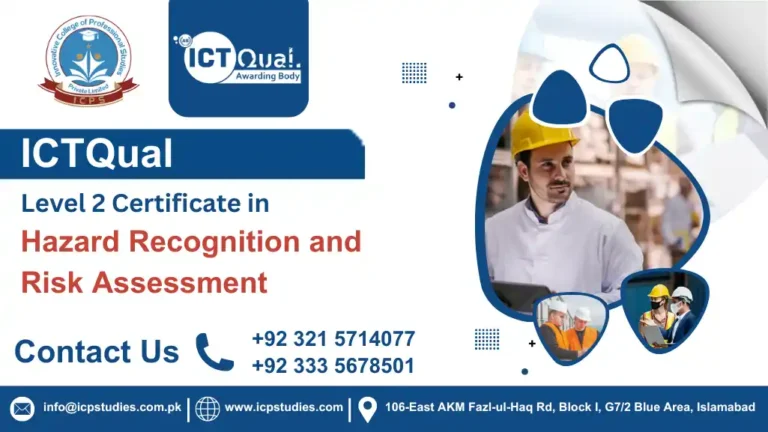In a world where security risks are constantly evolving, organizations need to implement robust management systems to safeguard their operations, employees, and assets. ISO 18788, the international standard for Security Operations Management Systems (SOMS), provides a framework for organizations to establish, implement, operate, monitor, review, and improve their security operations. For professionals in security management, gaining the skills to audit and assess these systems is essential. This is where the ICTQual ISO 18788 Lead Auditor Course comes in.
The ICTQual ISO 18788 Lead Auditor Course is designed for professionals seeking to deepen their understanding of security operations management and develop the skills necessary to audit and assess ISO 18788-compliant security systems. This course provides an in-depth understanding of the ISO 18788 standard and prepares participants to conduct effective audits of security operations. Whether you’re aiming to become a lead auditor, improve your auditing skills, or ensure your organization meets ISO 18788 standards, this course offers the practical expertise needed to achieve your goals.
The ICTQual ISO 18788 Lead Auditor Course is a comprehensive training program that prepares professionals to effectively audit and assess security operations management systems. With a focus on ISO 18788 standards, auditing techniques, risk management, and continuous improvement, this course equips you with the skills needed to enhance security, ensure compliance, and drive operational excellence.
By enrolling in this course, you will not only boost your career prospects but also gain the expertise to play a key role in securing your organization’s operations. Take the first step toward becoming a certified lead auditor in security operations management today!
All About ICTQual ISO 18788 Security Operations Management System Lead Auditor Course
Course Overview
The ICTQual ISO 18788 Lead Auditor Course is an in-depth training program designed for professionals looking to specialize in auditing Security Operations Management Systems (SeMS). ISO 18788:2015 provides an internationally recognized framework for managing security risks and ensuring effective security operations, and this course offers the essential knowledge and practical skills required to audit these systems effectively.
In this course, participants will gain a comprehensive understanding of ISO 18788, learning the standards and best practices for assessing, auditing, and improving security operations. The course is ideal for individuals aiming to become lead auditors or for those seeking to improve their auditing and security management skills. Whether you’re involved in security risk management, compliance, or auditing, this course will equip you with the tools needed to assess and ensure the effectiveness of your organization’s security management system, ensuring it meets international standards and remains compliant with regulations.
Through a combination of theoretical instruction and practical audit scenarios, this course prepares participants to plan, conduct, and report on security audits, identify non-conformities, and recommend corrective actions. Upon completion, participants will be well-equipped to lead audits of SeMS and contribute to continuous improvement in security operations.
Study Units
- Introduction to Security Operations Management Systems
- Core Elements of Security Operations Management
- Principles of Auditing Security Operations Management Systems
- Planning and Preparation for Security Operations Audits
- Conducting Security Operations Audits
- Reporting and Documentation of Audit Findings
- Corrective Action and Follow-Up
- Continuous Improvement and Professional Development
To ensure participants are adequately prepared to benefit from the ICTQual ISO 18788 Lead Auditor Course, certain entry requirements are recommended. These prerequisites ensure that individuals have the foundational knowledge and experience necessary to fully engage with the course content and excel in the training.
Recommended Entry Requirements:
- Basic Understanding of Security Operations:
- Participants should have a general understanding of security management and operations. This may include knowledge of how security systems function in an organization, risk management principles, and general security practices.
- Familiarity with ISO Standards:
- It is recommended that participants have prior knowledge of general ISO standards, particularly ISO 9001 (Quality Management) or ISO 14001 (Environmental Management), as these will help in understanding the principles behind ISO 18788.
- Professional Experience in Security or Auditing:
- While not mandatory, having prior professional experience in security management, auditing, or risk management will be beneficial. This experience will help participants apply auditing principles and understand the operational context of security management systems.
- Basic Knowledge of Auditing Principles:
- A fundamental understanding of auditing concepts (e.g., planning, conducting audits, and non-conformity reporting) is helpful but not required. Some familiarity with auditing best practices is advantageous for participants who are newer to the field.
- Commitment to Learning:
- The course involves both theoretical and practical elements, so participants should be committed to actively engaging with course materials, exercises, and case studies to develop the necessary auditing skills.
Pre-Course Reading and Preparation:
- Pre-Course Materials: Participants may be provided with recommended reading or preparatory materials that outline the key principles of ISO 18788 and security operations management systems. This reading is highly encouraged to ensure a solid understanding before starting the course.
By meeting these entry requirements, participants will be able to grasp the concepts taught throughout the course and engage in the practical exercises with confidence. If you meet these basic criteria, you are well-positioned to succeed in the ICTQual ISO 18788 Lead Auditor Course.
The ICTQual ISO 18788 Lead Auditor Course is designed for professionals who are involved in or responsible for auditing, managing, or improving security operations within organizations. It is ideal for individuals looking to enhance their skills in security management systems and become certified lead auditors. Below is a breakdown of who would benefit from this course:
1. Security Managers and Consultants:
- Why: Security managers responsible for overseeing security operations and implementing security management systems will gain essential knowledge on how to assess, audit, and improve their organization’s security measures.
- Benefit: This course helps security managers ensure their systems comply with international standards, mitigate risks, and improve overall security performance.
2. Lead Auditors and Auditing Professionals:
- Why: Professionals working as auditors or aspiring to become lead auditors can deepen their understanding of auditing security management systems based on ISO 18788.
- Benefit: By completing this course, auditors will gain the expertise to conduct audits, identify non-conformities, and recommend corrective actions within security operations.
3. Compliance Officers and Risk Managers:
- Why: Those responsible for ensuring compliance with security regulations and managing security-related risks will benefit from learning how to evaluate the effectiveness of security operations.
- Benefit: The course enables compliance officers and risk managers to understand how ISO 18788 can help ensure adherence to legal and regulatory requirements while improving security management practices.
4. Corporate Security Officers:
- Why: Security officers who oversee the security infrastructure of their organization and are involved in security risk assessment and management will find this course beneficial.
- Benefit: The course equips corporate security officers with the knowledge and skills to ensure that security operations meet ISO 18788 standards and are continuously improved.
5. Security Consultants and Advisors:
- Why: Security consultants who advise organizations on security operations and risk management can enhance their consulting skills by learning how to assess security operations management systems effectively.
- Benefit: Consultants will be able to assist clients in developing, implementing, and auditing their security management systems, ensuring compliance with ISO 18788 and improving security protocols.
6. Anyone Interested in a Career in Security Management or Auditing:
- Why: Individuals looking to start or advance their career in security management, auditing, or risk management will gain foundational and advanced knowledge in security operations and auditing systems.
- Benefit: This course is an excellent stepping stone for those wanting to pursue a career in security auditing, risk management, or security systems evaluation.
7. Internal Auditors in Security-Focused Organizations:
- Why: Internal auditors in organizations with a focus on security will benefit from learning how to audit the SeMS (Security Operations Management System) and ensure the security management processes are effective.
- Benefit: Internal auditors will learn how to assess the compliance, efficiency, and effectiveness of their organization’s security operations and contribute to ongoing improvement.
8. Professionals in Public and Private Sector Security:
- Why: This course is ideal for professionals working in both public and private sectors who are responsible for managing security at the operational level.
- Benefit: The course provides practical tools to assess and audit security management systems, ensuring that security operations are compliant with industry standards.
The ICTQual ISO 18788 Lead Auditor Course is perfect for anyone involved in security operations, risk management, and auditing within an organization. Whether you are an experienced security manager, a compliance officer, or an aspiring lead auditor, this course will provide you with the expertise and skills necessary to audit and assess security management systems effectively. This certification is a key asset for advancing your career in security management and auditing while ensuring your organization remains secure and compliant with global standards.
Learning Outcomes
Introduction to Security Operations Management Systems:
- Grasp the concept and importance of Security Operations Management Systems (SeMS).
- Understand the key principles, goals, and objectives of security operations management.
- Recognize the advantages of implementing SeMS within organizations to enhance security.
- Familiarize yourself with the ISO 18788 standard and its role in providing a structured framework for security operations.
2. Core Elements of Security Operations Management:
- Delve into the core elements of SeMS as defined in ISO 18788.
- Understand the roles and responsibilities of security personnel and other key stakeholders involved in security management.
- Analyze security risks, vulnerabilities, and challenges that organizations face in maintaining security.
- Develop strategies to mitigate risks, enhance security measures, and improve organizational resilience.
3. Principles of Auditing Security Operations Management Systems:
- Learn the audit principles, methodologies, and techniques applicable to auditing SeMS.
- Understand the audit process and how it can be applied to assess compliance with ISO 18788 requirements.
- Gain insight into the roles and responsibilities of auditors when conducting security operations audits.
- Build skills in auditing security management systems, addressing specific challenges and opportunities unique to security operations.
4. Planning and Preparation for Security Operations Audits:
- Develop tailored audit plans and objectives specific to SeMS.
- Identify relevant audit criteria, determine the scope of the audit, and select suitable audit team members.
- Conduct pre-audit activities such as document reviews, risk assessments, and stakeholder engagement.
- Align audit plans with the organization’s security goals, ensuring that audit activities are focused on critical areas.
5. Conducting Security Operations Audits:
- Implement audit activities, including on-site visits, interviews with personnel, and examining security protocols.
- Apply audit techniques to gather evidence, assess compliance, and verify the effectiveness of security operations.
- Communicate audit findings and observations clearly and effectively to auditees and other stakeholders.
- Foster collaborative relationships with stakeholders to ensure the audit process is transparent and constructive.
6. Reporting and Documentation of Audit Findings:
- Prepare clear, comprehensive audit reports that document findings, conclusions, and recommendations.
- Ensure accuracy, clarity, and objectivity when reporting audit results.
- Communicate audit outcomes to stakeholders and address any questions or concerns raised during the process.
- Provide actionable, practical recommendations for improving security operations based on audit findings.
7. Corrective Action and Follow-Up:
- Develop actionable corrective action plans to address identified security risks, vulnerabilities, and non-conformities.
- Monitor and verify the implementation and effectiveness of corrective actions to ensure sustainable improvements.
- Engage relevant stakeholders in the implementation process and track progress over time.
- Conduct follow-up audits to assess the effectiveness of corrective actions and identify additional areas for improvement.
8. Continuous Improvement and Professional Development:
- Implement strategies to drive continual improvement in SeMS, ensuring enhanced security operations over time.
- Commit to continuous professional development by staying informed on emerging trends and best practices in security operations and auditing.
- Share knowledge, experiences, and insights with peers to foster collaboration and learning within the auditing community.
- Contribute to the advancement of organizational security practices by actively participating in professional forums, networks, and development programs.
FAQs about ICTQual ISO 18788 Security Operations Management System Lead Auditor Course







